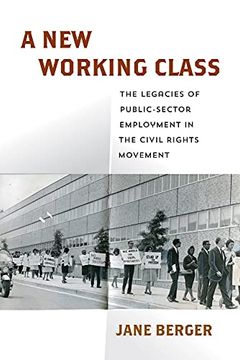Share
A new Working Class: The Legacies of Public-Sector Employment in the Civil Rights Movement (Politics and Culture in Modern America) (in English)
Jane Berger
(Author)
·
University of Pennsylvania Press
· Hardcover
A new Working Class: The Legacies of Public-Sector Employment in the Civil Rights Movement (Politics and Culture in Modern America) (in English) - Berger, Jane
$ 40.26
$ 45.00
You save: $ 4.74
Choose the list to add your product or create one New List
✓ Product added successfully to the Wishlist.
Go to My WishlistsIt will be shipped from our warehouse between
Friday, May 24 and
Monday, May 27.
You will receive it anywhere in United States between 1 and 3 business days after shipment.
Synopsis "A new Working Class: The Legacies of Public-Sector Employment in the Civil Rights Movement (Politics and Culture in Modern America) (in English)"
For decades, civil rights activists fought against employment discrimination and for a greater role for African Americans in municipal decision-making. As their influence in city halls across the country increased, activists took advantage of the Great Society--and the government jobs it created on the local level--to advance their goals. A New Working Class traces efforts by Black public-sector workers and their unions to fight for racial and economic justice in Baltimore. The public sector became a critical job niche for Black workers, especially women, a largely unheralded achievement of the civil rights movement. A vocal contingent of Black public-sector workers pursued the activists' goals from their government posts and sought to increase and improve public services. They also fought for their rights as workers and won union representation. During an era often associated with deindustrialization and union decline, Black government workers and their unions were just getting started. During the 1970s and 1980s, presidents from both political parties pursued policies that imperiled these gains. Fighting funding reductions, public-sector workers and their unions defended the principle that the government has a responsibility to provide for the well-being of its residents. Federal officials justified their austerity policies, the weakening of the welfare state and strengthening of the carceral state, by criminalizing Black urban residents--including government workers and their unions. Meanwhile, workers and their unions also faced off against predominately white local officials, who responded to austerity pressures by cutting government jobs and services while simultaneously offering tax incentives to businesses and investing in low-wage, service-sector jobs. The combination of federal and local policies increased insecurity in hyper-segregated and increasingly over-policed low-income Black neighborhoods, leaving residents, particularly women, to provide themselves or do without services that public-sector workers had fought to provide.
- 0% (0)
- 0% (0)
- 0% (0)
- 0% (0)
- 0% (0)
All books in our catalog are Original.
The book is written in English.
The binding of this edition is Hardcover.
✓ Producto agregado correctamente al carro, Ir a Pagar.

